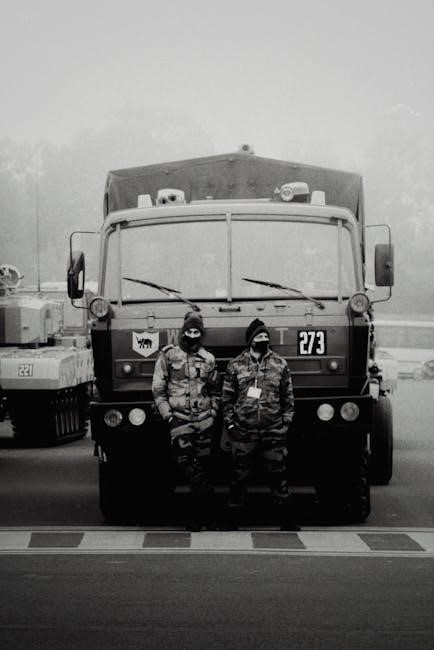An armor bearer historically served as a loyal assistant to a leader, providing physical and spiritual support. Today, this role adapts to modern ministry needs, ensuring leaders remain focused and protected while fulfilling their divine purpose.
Definition and Historical Context
An armor bearer, historically, was a trusted assistant to a warrior or leader, responsible for carrying and managing their armor and weapons. This role, rooted in ancient warfare, emphasized loyalty, strength, and protection. In biblical times, figures like Jonathan’s armor bearer (1 Samuel 14) exemplified bravery and devotion. The position evolved into a symbolic role in modern ministry, where armor bearers support spiritual leaders, ensuring their focus and safety. This role, while adapted, retains its core essence of trustworthiness and unwavering commitment to the leader’s mission and well-being.
Biblical References and Examples
The role of an armor bearer is deeply rooted in biblical history, with prominent examples in the Old Testament; Jonathan, son of Saul, and his armor bearer (1 Samuel 14:1-14) demonstrated loyalty and trust, overcoming great odds together. Similarly, Judges 9:54 and 1 Samuel 31:6 highlight the critical role of armor bearers in battle. These servants were not just attendants but vital partners, ensuring their leaders’ safety and success. Their bravery and unwavering commitment serve as a foundation for understanding the modern spiritual role of armor bearers in supporting and protecting leaders in ministry.
Key Duties of an Armor Bearer
An armor bearer’s key duties include providing strength, respect, and support to the leader, ensuring their preparation, and offering protection. They also manage equipment and handle logistics.
Providing Strength and Support to the Leader
An armor bearer’s primary role is to provide unwavering strength and support to the leader, ensuring their physical, emotional, and spiritual well-being. This involves maintaining a steadfast attitude of faith and peace, which inspires confidence and stability. By standing alongside the leader, the armor bearer helps alleviate burdens, allowing the leader to focus on their divine assignments. This support extends to handling personal matters discreetly, ensuring the leader’s dignity and effectiveness. The armor bearer’s presence is a source of encouragement, enabling the leader to fulfill their mission with clarity and purpose.
Ensuring the Leader’s Preparation and Protection
An armor bearer is tasked with ensuring the leader’s preparation and protection, both physically and spiritually. This involves handling logistical tasks, such as managing equipment and schedules, to keep the leader ready for their duties. They also pray for the leader’s safety and spiritual strength, interceding against potential threats. By minimizing distractions and maintaining a watchful presence, the armor bearer safeguards the leader’s focus and well-being. This role requires trustworthiness and loyalty, as the armor bearer stands as a shield, ensuring the leader is equipped and secure to fulfill their mission effectively and without hindrance.
Carrying and Managing the Leader’s Armor and Equipment
Historically, an armor bearer’s primary duty was to carry and manage the leader’s armor and weapons, ensuring they were battle-ready. Today, this role translates to logistical support, organizing and maintaining the leader’s resources. This includes handling equipment, coordinating schedules, and ensuring everything is accessible when needed. By managing these practical aspects, the armor bearer allows the leader to focus on their spiritual duties without distraction. This responsibility requires attention to detail and reliability, as the leader’s effectiveness often depends on the armor bearer’s ability to provide seamless support and maintain order in their operations and surroundings.

Spiritual Responsibilities of an Armor Bearer
An armor bearer’s spiritual responsibilities include praying for the leader’s strength and protection, interceding against spiritual attacks, and maintaining a strong, peaceful faith.
Praying for the Leader’s Spiritual Strength
Praying for the leader’s spiritual strength is a cornerstone of an armor bearer’s role. This involves interceding on their behalf, seeking divine empowerment, and requesting wisdom for their ministry. By praying, the armor bearer helps the leader stay grounded in faith and resistant to spiritual attacks. This proactive approach ensures the leader remains spiritually fortified, enabling them to fulfill their divine purpose effectively. Prayer not only strengthens the leader but also fosters a deeper connection between the armor bearer and the leader, creating a unified spiritual front.
Interceding for the Leader’s Protection
Interceding for the leader’s protection is a vital spiritual duty of an armor bearer. This involves praying for the leader’s safety from harm, both physical and spiritual, and seeking divine coverage over their life and ministry. By interceding, the armor bearer helps create a spiritual shield around the leader, guarding against attacks and distractions. This prayerful support ensures the leader remains secure and focused on their mission. Intercession also strengthens the leader’s ability to fulfill their calling without hindrance, allowing them to serve effectively while maintaining spiritual balance and protection.
Maintaining a Strong Faith and Peaceful Attitude
Maintaining a strong faith and peaceful attitude is essential for an armor bearer. This involves embodying trust in God’s plan, remaining calm under pressure, and exuding confidence. A strong faith fosters an environment of trust and stability for the leader, while a peaceful attitude helps de-escalate tensions and maintain harmony. By staying grounded in their beliefs, armor bearers provide emotional and spiritual stability, allowing leaders to focus on their mission without being burdened by doubt or anxiety. This mindset is crucial for effective support and reinforces the leader’s ability to lead with clarity and purpose.

Practical Duties in Modern Ministry
An armor bearer provides logistical support, handles distractions, and assists with tasks, ensuring the leader remains focused on their mission and responsibilities effectively.
Logistical Support and Organization
An armor bearer plays a crucial role in managing the practical aspects of ministry, ensuring seamless execution of events and tasks. This includes coordinating travel, organizing schedules, and preparing necessary materials. They also handle administrative duties, freeing the leader to focus on spiritual responsibilities. Effective logistical support requires attention to detail, strong organizational skills, and the ability to adapt to changing needs. By managing these behind-the-scenes tasks, armor bearers enable leaders to maintain their focus on ministry goals without distractions.
Handling Distractions to Keep the Leader Focused
Armor bearers play a vital role in minimizing distractions that could hinder a leader’s focus. They manage tasks such as scheduling, communication, and errands, ensuring the leader remains concentrated on their ministry. This includes filtering interruptions and handling logistical challenges. By taking care of these details, armor bearers create an environment where the leader can fully engage in their spiritual responsibilities. Their ability to manage distractions allows the leader to maintain clarity and effectiveness in their calling, free from unnecessary burdens.
Assisting with Leadership Tasks and Errands

Armor bearers are entrusted with managing daily tasks and errands, enabling leaders to focus on their ministry. This includes scheduling appointments, coordinating events, and handling communications. By overseeing these logistical details, armor bearers ensure the leader’s time is maximized for spiritual responsibilities. Their role extends to maintaining organization and efficiency, allowing the leader to concentrate on guiding the flock effectively. This practical support is crucial for the smooth operation of the ministry, ensuring everything runs seamlessly behind the scenes.
Qualifications and Characteristics of an Effective Armor Bearer
An effective armor bearer must exhibit unwavering loyalty, deep respect, and trustworthiness. They should possess a strong faith, commitment to the leader’s vision, and the ability to maintain confidentiality and discretion in all matters.
Loyalty and Deep Respect for the Leader
Loyalty and deep respect are foundational qualities for an effective armor bearer. They must wholeheartedly support the leader, upholding their authority and vision without question. This loyalty extends to maintaining confidentiality, handling tasks diligently, and displaying unwavering commitment. The armor bearer’s role demands a servant-like attitude, prioritizing the leader’s needs above personal interests. By fostering trust and respect, they create a secure environment for the leader to thrive spiritually and minister effectively. Loyalty is not just an obligation but a heartfelt dedication to the leader’s divine purpose and success.
Trustworthiness and Discretion
Trustworthiness and discretion are critical traits for an armor bearer, as they often handle sensitive information and tasks. They must maintain confidentiality, ensuring that personal or strategic matters remain secure. Discretion involves wise judgment in handling situations, avoiding gossip, and refraining from sharing unnecessary details. A trustworthy armor bearer fosters an environment of security, allowing the leader to focus on ministry without concern for leaks or mismanagement. This trait builds strong relationships and reinforces the leader’s confidence in their support team, making it a cornerstone of effective armor bearing in both biblical and modern contexts.
Commitment to the Vision and Mission of the Leader
Commitment to the leader’s vision and mission is essential for an effective armor bearer. They must fully align with the leader’s purpose, actively supporting their goals and objectives. This involves understanding the leader’s priorities and contributing to their success through prayer, logistical support, and personal dedication. By sharing the leader’s vision, the armor bearer ensures their efforts are focused and purposeful, enabling the leader to fulfill their divine calling without unnecessary distractions. This unwavering commitment strengthens the leader’s ability to achieve their mission effectively;

Challenges and Rewards of Being an Armor Bearer
Serving as an armor bearer brings challenges like balancing personal life and ministry, facing spiritual pressures, yet offers rewards of faith growth and leadership enhancement.
Balancing Personal Life with Ministry Responsibilities
Serving as an armor bearer demands a significant commitment, often blurring the lines between personal life and ministry duties. The role requires immense loyalty, emotional support, and availability, which can strain relationships and personal well-being. Armor bearers must intentionally set boundaries and prioritize self-care to maintain a healthy balance. This involves effective time management, spiritual replenishment, and open communication with both family and the leader they serve. Striking this balance ensures sustainability in ministry while nurturing personal growth and relationships, ultimately enriching both areas of life.
Overcoming Spiritual Attacks and Pressures
An armor bearer often faces spiritual battles, as their role involves protecting and upholding the leader. These challenges require unwavering faith and prayer to counteract demonic pressures and distractions. Armor bearers must remain vigilant, relying on divine strength and scripture to withstand spiritual warfare. By maintaining a strong prayer life and peaceful demeanor, they create a spiritual shield for both themselves and their leader. This enables them to navigate pressures effectively, ensuring their ministry remains unaffected by negative forces. Continuous spiritual growth and trust in God are essential for overcoming these attacks and fulfilling their role successfully.
Experiencing Growth in Faith and Leadership Skills
Serving as an armor bearer fosters significant spiritual and personal development. Through faithful service, individuals deepen their trust in God and refine their leadership abilities. The role requires humility, dedication, and a willingness to learn, which often leads to increased confidence and wisdom. As armor bearers support their leaders, they gain hands-on experience in ministry, enhancing their capacity to handle responsibilities. This growth not only benefits them personally but also equips them to take on future leadership roles within the church, contributing to the broader vision of the ministry.
The armor bearer’s role is vital, providing essential support and empowerment to leaders, enabling them to fulfill their purpose effectively and strengthen the church’s vision.
Impact on the Leader’s Ministry and Success
The armor bearer’s role significantly enhances the leader’s effectiveness and focus. By handling logistical tasks, providing spiritual support, and managing distractions, they enable the leader to concentrate on their ministry. This support ensures the leader’s vision and goals are achieved, fostering a stronger, more impactful ministry. The armor bearer’s dedication directly contributes to the leader’s success, allowing them to fulfill their divine purpose effectively. Their role is instrumental in maintaining the leader’s spiritual strength and operational efficiency, which in turn benefits the entire church and its mission.
Contributing to the Overall Vision of the Church
The armor bearer’s role is vital in supporting the leader, enabling them to focus on the church’s vision and goals. By handling logistical tasks and spiritual needs, they free the leader to minister effectively. This support ensures the church’s mission is advanced, fostering growth and unity. The armor bearer’s dedication strengthens the leader’s ability to guide the congregation, aligning actions with the church’s purpose. Their role is essential in helping the church fulfill its divine mandate and expand its outreach, making them a cornerstone of the ministry’s success and spiritual impact.
